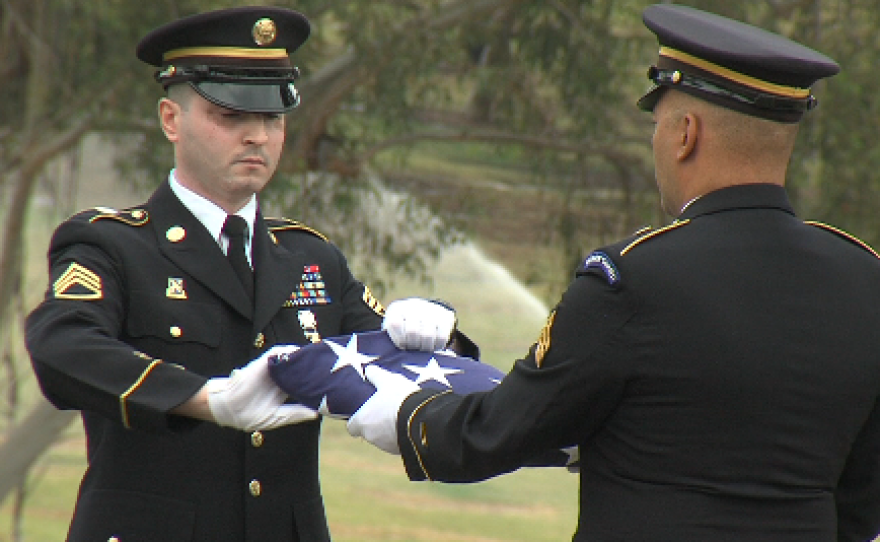Building a career is no easy task for those in the National Guard who have to balance their commitment to be available for military training with a civilian job.
The National Guard can be mobilized at any moment in a crisis, but its members have to support themselves by working in the civilian workforce. While many veterans find it challenging to transition from military to civilian life, those in the Guard have to keep their footing in both the military and civilian worlds at the same time.
Christopher Avila, 23, has been in the Guard for three years. And he loves it.
He shares a small house with his mother and sister on the edge of City Heights. The closet in his small bedroom pretty much reflects his life — on one side is all his civilian stuff, on the other is his Guard gear.
“Essentially, what I have in here is my dress uniform,” he said, rolling back the door to show neatly stacked camouflage duffel bags and backpacks. “It’s about half of my closet.”
The commitment to the National Guard is one weekend a month and two weeks training in the summer. But that’s seldom how it works out in practice, Avila said.
“On paper they say one weekend a month, which is what you tell your employers,” he said. "And sometimes the employer will have trouble with even one weekend a month. That’s because it’s like, 'Hey, I have to work around scheduling, we have to shift that weekend around, just so you can have the day off.' But sometimes that one weekend a month, it was more like, 'We're going to the field for five days.’"
Avila is an technology specialist. He often gets called up for extra training on new systems. For a while he had a job with a civilian company where he was able to use his IT skills. But he was called to Guard training two weekends in a row and then, a couple of weeks later, he had to leave for two weeks for training in Fort Hood.
That was too much for his employer.
“Then, when I came back, they came to the conclusion that they had to let me go because I wasn’t meeting their quota, or misconduct or something like that. There was none of that,“ Avila said. “But companies have to find a way around letting people go sometimes, so that they don’t get in trouble.“
Companies that hire people in the National Guard cannot legally fire them for fulfilling their Guard commitment. But Avila said he’s not the only one in his unit who has lost a job after going on one too many military trainings.
At this point, Avila has found another job — this time at T-Shirt Mart — using his graphic design skills. It’s in Point Loma near the Navy base, and many of the customers are in the military. His boss is understanding about his training schedule.
“He was like, ‘I understand, We like your design talent. We’re going to bring you on. Just make sure you keep us informed two weeks ahead,'” Avila said.
"We do have a good understanding of what it means to be in the military," said Arthur Nava, a T-Shirt Mart manager. "And we try to help those people out as much as we can. It’s a way of giving back to the community."
Avila has applied for a one year deployment to Iraq in October.
"When he comes back, his job will be here," Nava said.
From a job to a career
Finding a job is hard enough, but building a career is even more difficult for those with Guard contracts.
Rida Sihab Mansour, 32, is a platoon staff sergeant who’s just signed on for another three years, after serving eight years as a translator for the Army National Guard, including one year on combat duty in Iraq.
Mansour, a Moroccan, speaks fluent Arabic, a skill that was much in demand during the war in Iraq.
“I’ve got 13 medals," he said proudly as he showed off his dress uniform in the living room of the condo he shares with his wife and grandmother. “This is my bronze star. That’s the highest. This is my army achievement ribbon, anti-terrorism, and this is the National Guard one.”
His unit is based in San Francisco, and though he sometimes attends training in Los Angeles, his monthly weekend commitments often mean he is away for three or four days.
Because Mansour served as a full-time recruiter for two years after being deployed, he qualified for the G.I. Bill. He is finishing a degree in security management, but that has not been enough to get his foot on the career ladder. He bought his condo with the help of a VA loan, but now he has a mortgage to pay.
“I’ve applied everywhere,” he said. "And I’ve got a pretty good resume. I’ve even applied to a couple of security companies and I’ve seen them hire the guy next to me who didn’t even know how to fill out an application. They didn’t hire me. And I’m going for a bachelor's degree within that field.“
Even in companies that favor hiring military, National Guard members find themselves competing for jobs with vets who don’t have to ask their employer for time off every month.

Mansour was asked if he thought his commitment to the Guard was what was making it so difficult to build a career.
“I didn’t at first, but I’m positive it does right now,” he said.
He earns a little money - about $100 a day – serving on the Honor Guard at military funerals. He enjoys the days when he can put on the uniform and serve.
“I love it,“ he said. “I’m very proud of being part of that team. It’s a really beautiful ceremony, and we train to be perfect at it.“
Mansour plans to stay in the Guard for 20 years. That way he’ll earn retirement benefits. At least that’s something, he said, even if the civilian world doesn’t offer him any security.







